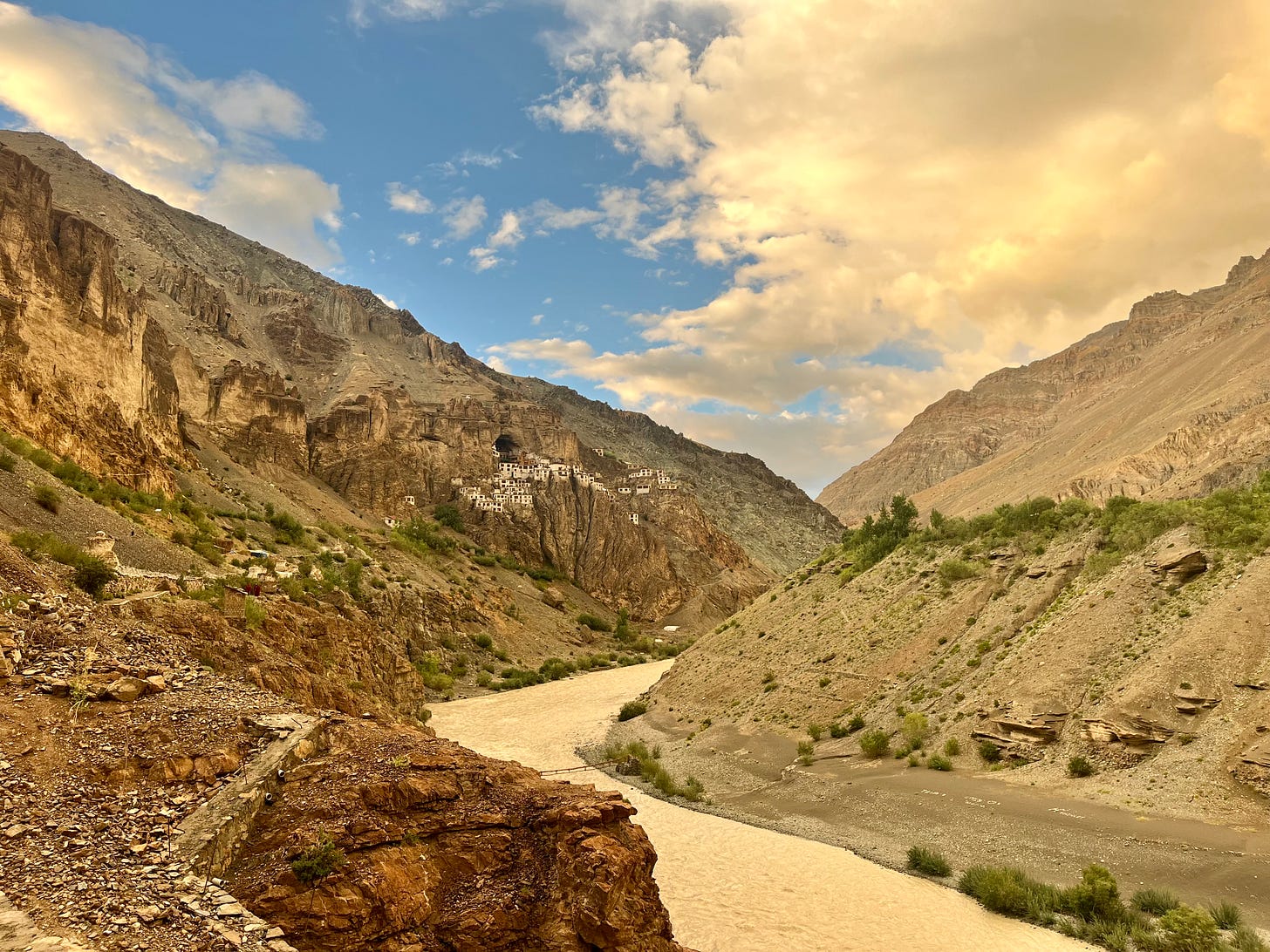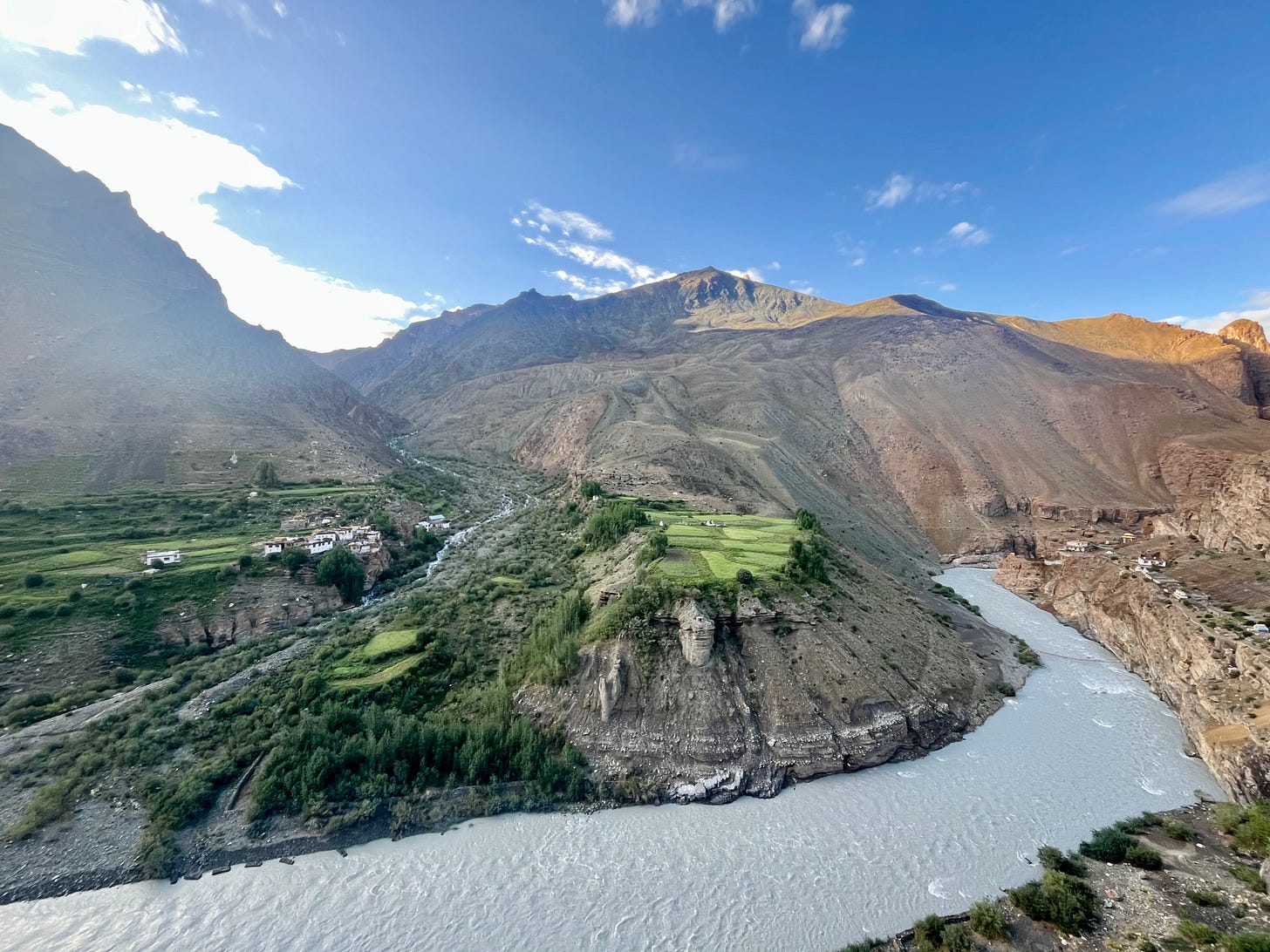The Cave of Liberation
📍Kathmandu, Nepal (Issue 196)
—Julley, is that battery acid? I said.
—Julley! Yes, yes, yes…. said the oldest monk of the four.
—I'll carry it, I said.
And with three litres of battery acid, alongside these wonderful monks, I walked up the slippery mountainside towards the monastery. Why that monk needed quite so much battery acid, I never found out. I did, however, discover that monks are not so different from each of us as you might imagine.
It had been a long journey: Two days on the motorbike from Leh (population 31,000) along good roads to Kargil (pop. 16,000). From there, you hook south along broken roads for two more days to Padum (pop. 2,000). Then, damn it, the roads disappear almost entirely, and it's a three-hour off-road adventure. The Indians call these 'Adventure Roads'; they are tracks, not roads, and sometimes you want the adventure over—listen carefully, and you'll hear me beg Ram, Shiva, Buddha, Christ, and Brahman for black-top tarmac.
By now, my lower back ached in spasms from all the motorbike riding. The Royal Enfield Himalayan was suited to these roads, but my body wasn't. Finally, you roll into Purne (pop. 5?) and lock the bike at the roadhead marked by a small empty tin shed, presumably once home to an ancient ticket inspector (has he died of exposure or fled to Leh?). Leave the motorbike helmet hanging in the breeze from the handle bar, and you proceed on foot. Just follow the Lungnak River upstream; it's thick and brown and turbulent.
I walked towards the monastery and dense grey clouds shrouded the mountains above my head; they swelled and grew fatter and began to spit some lightning. The clouds, thick as they appeared, rotated and throbbed, almost like another planet had crossed our orbit. I felt you could walk on their surface. I rushed along the rough mud crack beside the river. Under the hurrying clouds, the face of the mountain was a hearty red. There are constant signs of recent landslides from the monsoons (the Ladakhis call them 'cloud bursts' which sound quaint, somehow disguising their lethal severity). The final river, the crazed Lungnak rapids of melting glaciers (far beyond our horizon), was crossed with a new wooden slatted bridge. Here you might spot monks in burgundy shawls in the distance. I did, and I was thrilled. The gloomy guest house was close by! Then it was a short walk to Phuktal Monastery, which means 'the cave of liberation' in the endangered Zangskari dialect of the Tibetan language.
The whole thing is terrifically romantic. When travelling, the destination is often the goal, but it can disappoint. Who, frankly, wants to reach John o’ Groats? For stale cake and Nescafé coffee at the downtrodden public leisure centre? The ride between Land’s End and John o’ Groats is undoubtedly the pleasure—the journey is the destination. Therefore, I've found that sometimes the destination feels a flop; somehow underwhelming, like becoming a billionaire on paper or that long, blank, final day of a school summer holiday when you have your new shoes ready and crayons packed and nothing to do.
But this destination, at Phuktal Gompa, was no flop! Nor, of course, was the adventure to get there. The monastery, now 2,550 years old, is built in a cave on the side of the mountain. The flat-roofed buildings, which are all subject to seasonal 'slides'—often tragic—are built from mud bricks gathered from the earth of the same mountain. In fact, a couple of Ladakhis were collecting and shaping mud bricks as I approached. "Julley!" we said to one another. Hello, and goodbye, and thank you, said all at once.
I was heading to one of India's most remote Tibetan Buddhist monasteries. This is a silent, sacred, remote spiritual outpost, far-flung and uncorrupted. It didn’t matter that it was raining gently when I arrived at the guest house. Then the rain got very heavy and nearly washed us away, so I stayed inside and had several black teas in the damp dingy dining room (there was no electricity). It was six pm, an hour and a half before sunset, but the clouds brought us a kind of red nightfall that blanketed the valley, wrapping us up. It was, I imagine, what the Day of Judgement will feel like, with the furious thunder rolling from one end of the valley to the other; you could almost see it tumble past. I sat at the paned glass window and waited for the Day of Judgement to be over. Am I going to hell? I wondered. Probably! I thought, cheerily. It did pass. It was only the remnants of a monsoon that had lost her steam, and, now exhausted, had lurched over the Greater Himalayan Range, reaching the Zansakar valley.
Meanwhile, I sat sipping tea: I felt at once tiny and insignificant and in awe.
As the storm cleared, a group of monks arrived, chanting Om Mani Padme Hum, holding prayer beads made from lotus stem, each bound up in their mauve cloaks; shaved heads topped with orange woolly hats made from stiff yak wool. These hats had little ear covers now lifted to resemble little orange elf ears. Elf ears! I grinned as they sat down beside me. The monks have all studied since they were children, either in Phuktal Monastery or Hemis, which is larger and closer to Leh (the regional capital). They were all in their twenties and thirties and had come to the guest house for the Wi-Fi.
Of course! The Wi-Fi! There is something absurd in watching cultures clash: monks scrolling Facebook! Can you imagine! In the same way, you don't expect a priest to smoke hash, or a nun to bungee-jump. These devotees are presumably reasonably well-adjusted, but they are victims of the addictive nature of their screens all the same. Anyway, the monks drained the Wi-Fi. I had wrongly assumed that monks are impervious to the dopamine hit of social media—they are as addicted as you or I. I suppose our reaction should be ‘phew’? Or maybe, ‘oh no, there is zero hope!’ I can only assume they are more mindful when hitting Like and their feed is less horrible, more balanced: Fewer women doing gymnastics, less bullfighting and Pain Olympics, and more cats playing chess. More James Blunt, less J.D. Vance. But we will never know.
I woke up before my alarm. At five, I walked the kilometre to the monastery itself. As I said, it's built into the cave. It's as remote as purgatory, as reachable as Atlantis, as mystical as Babylon. And I went for breakfast! I climbed the steps and wandered through low ceiling tunnels which linked one passage to the next and up more steps designed for little feet so my heels hung off the edges. According to legend, the monk Zangpo caused a spring to appear from the cave and a tree to grow on top of it. Monks later built a honeycomb of houses and meditation rooms. The sky, by 05:15, had become that washed-out blue, ready for the sun to start climbing but not yet rid of nightfall—some stars still hung high above me. The yellowed brick buildings almost lit up the dank passageways as I reached the meditation hall. Two wooden doors swung open silently, revealing a room draped in coloured fabrics, royal blue and deep green and reds and yellow; all gold trimmed and hanging dead still in the morning light. We (the monks and I) took our cushions in front of a blazing golden Buddha, who sat with his eyes ajar, his lips in an eternal smile, peacefully inviting us into enlightenment. The puja began (the morning ceremony) and I sat with my eyes closed next to a friend of mine, Sid, who I had met the night before. The monks went on with their chanting, interrupted only by a blow-legged man who came in and out of the hall with an enormous silver teapot, suspended between his legs, from which he poured butter tea, made from yak butter, into neat ceramic cups that the monks unbundled from somewhere in their gowns. So the great low groaning and bellowing and chanting of the twenty-five monks (aged from nine to perhaps one hundred) was complimented by the shleuurrr shluurpping shlerpp of monks sipping their hot butter tea. From my cushion, I could see out into the adjacent room, where, on an open fire, the bow-legged man returned to as he boiled another vast kettle.
After the puja, the child monks began studying (and throwing rocks at one another). Sid and I watched the sunrise from the roof of the monastery,
—It can't be chance, it can’t be; there must be something else going on, something deeper, said Sid.
—What do you mean? I said.
—Do you really think billions of years of accidents created all of this?
Well, I didn't think it could be mere ‘chance’ either, but I said nothing. What could I say? No words, blunt as they are, could have captured how I felt as I stood in that valley: I felt alive! I felt both small and vast; empty and completely full. The sun was splintering over the horizon, and last night’s stars were going out one by one. The red rocks were sharp against the blue sky, and the brown river below continued to rush with the icy glacial waters. It's too damn beautiful to be an accident, I thought; it’s too dramatic and too surreal.




I felt as though I was there under the remarkable skies. Thank you
Yak Butter Tea!
I had this in London – there's an amazing nook in Woolwich we should go to when you're back. Excited for your Nepal adventures.